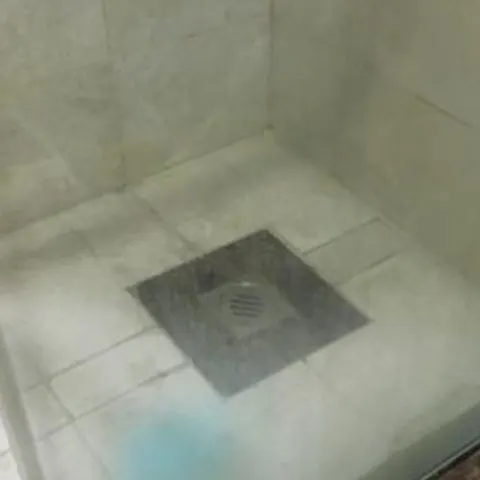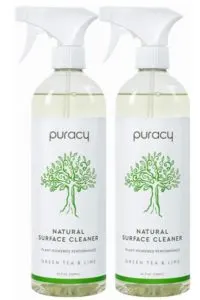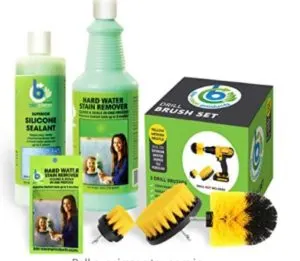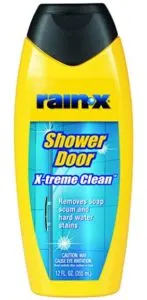Glass shower doors add a modern and elegant style to a shower, but there is work in maintaining this pristine look. Unfortunately, glass shower doors can look very unattractive after collecting soap scum, body oils, and stains when not cleaned. These stains can also permanently damage your glass shower doors if not removed early enough.
The secret to dealing with the stains is cleaning the glass doors with a cleaner and a sponge frequently. Soap scum will be something you’ll have to always deal with; learning how to clean it is as vital as learning how to clean it. We have a very detailed guide on cleaning glass shower doors, removing hard water stains, and preventive measures you can follow.
Things You’ll Need
- Cleaning product- Distilled white vinegar, lemon juice, baking soda, ammonia, commercial glass cleaner
- Distilled water
- Spray bottle or bucket
- Microfiber cloths
- Scrub sponge
- Safety wear- rubber gloves, face mask, protective goggles
- Dishwashing liquid
- Squeegee
Directions
- Wet the glass shower doors with water with a shower spray or splashing from a bucket.
- Prepare your cleaning mixture. Fill a spray bottle or a bucket with one part white vinegar and three parts warm distilled water. Keep in mind that vinegar may damage showers made of stone.
- Spray the whole surface with the cleaning mixture. Make sure you don’t miss any spots, and then let it soak for a few minutes to work on the gunk. The vinegar disintegrates the hard water stains and soap scum. It is best to wait for long if the layer of scum is thick.
- Pour some baking soda on a wet scrub sponge and scrub the glass doors. Pay attention to places where the doors overlap, the edges, and the tracks. The baking soda acts as an abrasive without having to scratch the glass.
- Once the glass is clean, rinse the glass surface with clean water. If there are still stains on the glass door, respray the cleaning mixture and give it a longer soaking time.
- Dry the glass door from top to bottom using a microfibre cloth.
- Wear some protective gloves and spray some commercial glass cleaner with a pH range of 7 to 8. After a few minutes, wipe it down with a microfibre cloth or a non-scratch sponge. Commercial glass cleaners clean and also prevent soap scum from forming on our glass doors.
- Maintain clean glass shower doors by drying them with a squeegee or microfiber cloth after every shower.
What is the best cleaner for glass shower doors?
While some people like to make their glass cleaners, most prefer the convenience of buying them ready to use. It also makes your glass shower doors’ daily cleaning routine more manageable and saves time. Glass cleaners come in different formulations, ingredients, and uses. It is best to choose one that best fits your needs; however, this can be quite tricky.
Check this too: Best Tension Pole Shower Caddy in 2021
An excellent glass cleaner removes soap scum, hard water stains, lime stains, and polishes without leaving streaks or scratch marks. Most brands will claim to have the best quality, but some have similar strength to just soapy water. Remember to always read the ingredients before buying any cleaning product; some may be abrasive or have allergens. This guide will help you choose the best glass cleaner for your glass shower doors.
Puracy All-Purpose Cleaner (Best Overall)
Puracy is one of the most trusted brands of window cleaners. It has a non-toxic, plant-based formula and all-natural, making it safe to use. It is also quite efficient as it is an all-purpose cleaner. It is also suitable for wood, sealed and unsealed stones, marble, granite, and stainless steel surfaces. It leaves behind a relaxing lime and green tea scent and no streaks on your glass surfaces.
Features
- Plant and vegetable-based ingredients
- Multi-purpose for various surfaces.
- Green tea and lime scents
Pros
- Safe to use around animals and children
- It does not leave any residue behind.
Cons
- It may leave streaks on glass and granite surfaces.
- The scent may be too intense for some people.
Ultimate Bio-Clean (Best for hard water stains)
This surface cleaner from Bio-Clean is excellent for removing stains from hard water, rust, soap scum, and other hard-to-clean spots. It has the effectiveness of an industrial stain remover but without the harsh chemicals and intoxicating smells. It also comes in a cream texture instead of a spray, which scrubs and spreads well.
Features
- Ingredients are abrasive based on a non-chemical compound.
- Calcium mineral limescale and rust stains remover
Pros
- Removes hard water and rust stains too from various surfaces
- No harsh fragrances
- The abrasive feature works well on difficult stains.
Cons
- Packaging makes it a bit difficult to dispense.
- It may be too harsh when used with bare hands.
Rain-X 630035 Shower Door Cleaner ( Best for soap scum)
Rain-X is our choice for soap scum removal because it leaves your glass door surface looking squeaky clean and clear with no smudges, streaks, or scratches. It comes in a standard squeeze bottle to use on glass surfaces only but efficiently works on various stains such as rust, scum, calcium, and lime stains. Though a bit labor-intensive, it gets the work done.
Features
- Non- abrasive ingredients for soap scum removal
- Creamy texture in a squeeze bottle
- Neutral fragrance
Pros
- Mild fragrance
- Easily rinses off
- Non-abrasive formula
Cons
- Pricey
- Used only on glass surfaces
- May not work on hard water stains.
How do you get hard water stains off glass shower doors?
Hard water contains high mineral quantities, which leave spots and stains when it dries on surfaces. When you do not remove these stains for a while, they may become more challenging to clean, and you may even have to replace your glass doors. Fortunately, it is possible to remove hard water stains with certain powerful products and a little elbow grease.
How bad your hard water stains are and how difficult they will be to remove, depends on how much mineral content is in your shower water and how long the build-up has been accumulating.
To remove hard water stains, you can make your mixture from household products or get yourself a commercial glass cleaner for hard water stains. For more stubborn stains, you use both commercial cleaners and your DIY mix together. And because hard water stains are alkaline, acidic products are more effective.
-
Distilled white vinegar and liquid dishwashing soap
Distilled white vinegar is as effective as some pricey cleaning products with the benefit of also being natural and non-toxic. White vinegar gets its effectiveness from its acidic nature. The only downside to using vinegar is it damages stone.
Combine warm distilled white vinegar and some drops of liquid dishwashing soap in a spray bottle or a bucket. Spray or pour the mixture on the glass shower door and let it soak for a while to act on the lime stains. Use a sponge to scrub off the spots, and they lift off quite easily.
For tougher stains, you can add some lemon juice to the potency of the vinegar.
-
Baking Soda
Mix baking soda with distilled water or white vinegar to make a paste. Rub this paste on the shower door with a wet sponge or microfiber cloth. The baking soda will act as a scouring agent on the stains without scratching the glass. Then let the paste sit on the surface for about 20 minutes. Use a wet sponge or cloth to wipe scrub off any remaining stains. Then rinse with clean water and dry the door with a dry microfibre cloth.
-
Ammonia
Ammonia can easily remove heavy hard water stains. When using ammonia, it is best to take precautionary measures; keep the window or door in the room open and wear a face mask and gloves. Ammonia fumes can be toxic when inhaled and may burn or irritate the skin. Do not mix ammonia with bleach.
Combine three parts water and one part ammonia in a spray bottle. Spray the mixture on the door, including the edges, and scrub while it is still wet with a scrubbing sponge or nylon brush. Rinse with clean water and dry it with a squeegee.
For a thin layer of lime stains, you can use equal parts of distilled water and ammonia and follow the same cleaning process.
-
Lemon juice
Lemon juice is an alternative for vinegar with some good fragrance. Squeeze about three lemons and mix with some distilled water. Spray the shower door with the mixture and wait about 5-10 minutes before scrubbing off the stains with a scrub sponge. Then rinse with some clean water and dry with a cloth.
You can also cut a lemon into halves, dip the cut side into baking soda and rub the lemon on the glass. Repeat this process until you get rid of all the stains. Rinse the glass surface with distilled water and dry it with a microfibre cloth or paper towel.
-
Commercial glass cleaner
If the stain has been on the surface for a very long time, it may be too firm for household cleaners to remove. You can get commercial scum removers that are safe to use on glass without leaving scratches on the surface. Get a commercial cleaner that contains phosphoric acid to remove the lime stains from the hard water.
Be mindful that some commercial cleaners get their stripping strength from powerful chemicals, so always have your rubber gloves and face mask when using them.
Read the instruction manual on applying the product to the glass surface and scrub using a sponge or nylon brush. Rinse the surface with distilled water and wipe it down with a cloth or a squeegee.
How to prevent further hard water staining in the future.
The best way to combat hard water stains is to prevent build-up in the first place, and there are several ways you can achieve that.
- You can add water softeners to your showering water, which dissolves the minerals. It will not only prevent hard water stains from forming, but it will also prevent clogging of your water pipes and shower-head.
- Dry your shower doors using a microfibre cloth or a squeegee after showering.
- Regularly clean your shower doors every week to prevent and remove any build-up present.
- Prevent future stains by applying a protective sealant to your shower doors. Apply a wax-based protective coat once or twice a year. The hard water will not stick to the protective layer; instead, it will just run off and dry without leaving residue.
You may have to use several cleaning products to figure out what works for you. However, prevention is the best way to deal with hard water stains.
How do hotels keep glass shower doors clean?
Hotels have a reputation to build and maintain, and one of the most critical aspects is hygiene. Shower doors collect soap scum and mineral build-up, and even if clean, this will make a bathroom look dirty and unattractive. Hotels use preventive measures to keep glass shower stalls clean as that simplifies housekeeping work and maintains that pristine look even without cleaning. Here are some of the ways hotels keep glass shower doors clean:
- Regularly cleaning the glass shower doors maintain their crisp, clean look. Hotels clean the shower doors up to two times a day, which gets ahead of any cum and stain accumulation. Regular cleaning reduces the work housekeeping will have to do in the next cleaning.
- Besides frequent cleaning, hotels also use the best commercial glass cleaners, which break down scum and hard water. The best commercial glass cleaners should be acid-based, non-abrasive,
- Another permanent way hotels keep glass shower doors clean is by adding water softeners to their water systems. Water softening removes the minerals- calcium and magnesium- that make water hard. Soft water scum is easier to clean up and doesn’t build up to hard water stains.
- Most shower glass doors in hotels have an ultra-thin, protective barrier that repels water and helps prevent stains. So, how does this coating work? Since glass is naturally porous, it allows hard water minerals and contaminants to penetrate the surface and cause staining and corrosion. This protective film covers the microscopic ridges on a glass surface, creating a smooth surface that the hard water minerals and other contaminants cannot embed.
Does vinegar clean glass shower doors?
There are four types of vinegar; apple cider vinegar, white distilled vinegar, balsamic vinegar, and red or white wine vinegar. White distilled vinegar is the best for cleaning glass shower doors. It has about 5% acidity, which is quite similar to most commercial glass cleaners’ acidity level.
Vinegar contains acetic acid, which gives it a sour taste and pungent smell. The acidic composition of white vinegar breaks down scum and hard water stains on glass surfaces. White vinegar is also streak-free, eco-friendly, non-toxic, and has antibacterial properties that fight against mold and mildew.
Vinegar is useful in several ways when removing soap scum and stains from a glass surface:
- Plain vinegar: Pour some white vinegar into a spray bottle and spray the stained glass. You can warm the vinegar for a minute in the microwave. Let it soak for about 5 minutes, then scrub with a scrub sponge and rinse with clean water.
- Vinegar with distilled water: Dilute the vinegar in a spray bottle with equal parts of hot distilled water. Spray it on the glass surface and let it sit for 5-10 minutes. The more you let it soak, the better it is for more stubborn stains. Add a few drops of dishwashing soap, wash the shower doors as you usually would with a sponge, and rinse with distilled or soft water.
- Vinegar and baking soda: Combine baking soda with a few white vinegar drops to make a paste. Smear the paste on your shower door, use a scouring sponge to scrub off the stains, and rinse with distilled water.
As safe as vinegar may be, it does not react well with all surfaces. You have to be careful with what it comes into contact with when cleaning. It would be best if you did not use it on stone surfaces such as marble and limestone; it corrodes and makes the stones lose their shine.
Vinegar is an excellent glass cleaner, but it will not prevent a build-up of soap scum. You have to maintain a regular cleaning schedule to get ahead of the scum build-up.
Can WD40 clean glass shower doors
WD40 has several uses, and one of them is getting your glass shower doors squeaky clean. WD40 disintegrates the hard water stains and soap scum. Follow these steps to clean your glass shower doors using WD40:
- Put on your safety gear. Chemicals in cleaning agents can be quite harsh and harmful to your health. Inhaling the fumes can cause respiratory issues and cause skin irritations. Wear a face mask and rubber gloves. You can also wear protective goggles if you have very sensitive eyes. Open the doors and windows for ventilation.
- Spray the WD40 liberally on the glass doors and give it some time to soak and break down the scum and stains. The longer you let it absorb, the easier it will be to remove tougher stains.
- Wipe down the glass surface with a lint-free cloth. Most times, the WD40 will do all the work and break down the stains. So if wiping doesn’t work, you may have to scrub the stains using a nylon brush or scouring pad. When the stains come off, wipe down the product residue with a microfibre cloth.
- Repeat the process to get rid of stains that have been sitting on the glass surface for a while.
- Rinse the door with clean water and dry with a lint-free cloth.
Besides getting rid of soap scum and hard water stains, it prevents the soap scum from sticking to the glass shower for a while after using it. Though not permanent, including WD40 in your regular cleaning will keep soap scum and stains at bay.
Cleaning glass shower doors with baking soda
Baking soda is a great cleaning agent for dirty glass shower doors when you need an abrasive cleaner, yet soft enough to not scratch the surface. Baking soda is also a natural deodorizer that absorbs bad odors.
Adding vinegar to baking soda increases its cleaning strength. White vinegar will help to cut through the hard water stains. Alternatively, you can use lemon juice, which is also an acid. The reaction between an acid and a base lifts off the stains from the glass surface. Tougher soap stains will need a more potent agent to remove. Here’s a quick guide on how to use baking soda to clean your glass shower doors:
- Pour a cup of baking soda in a container and add enough acid of your choice: lemon juice or white vinegar to make a slightly runny.
- Use a clean cloth to apply the paste on the glass door and gently scouring off the dirt.
- Give the past some time to act on the dirt and then wipe it off with a wet cloth.
- Rinse the door with warm water to remove any remaining residue and grime.
- Wipe the surface with a microfibre cloth and buff with a soft chamois cloth after it dries for a streak-free shine.
Alternatively, you can apply dry baking soda on the glass door with a soft sponge or cloth. Then activate the baking soda by mixing equal parts of warm distilled water and white vinegar in a spray bottle, and spray it on the glass door. Let it soak for a while, then wipe it off with a wet microfibre cloth.
Can you use Windex on shower glass?
Windex is among the most trusted brands when it comes to getting rid of stubborn shower stains and dirt. Windex also has ammonia-based and vinegar-based cleaners, which effectively lift off hard water stains from your glass shower doors.
Spray Windex generously on the glass door and wipe with a microfibre cloth. It will remove streaks, smudges, and soap scum.
However, some users claim that Windex is not very powerful on hard water stains. You can either use the vinegar method before cleaning with Windex or add some ammonia to your Windex to increase its lifting strength. Also, Windex glass cleaner does not have disinfecting properties; you will have to add a disinfectant to your Windex bottle to kill germs and mold.
Ultimately, Windex is excellent as a daily cleaner for your glass shower doors.
How to avoid scratching glass shower doors when cleaning them
We all want to effectively clean our gross glass shower doors while maintaining that crisp glossy finish at the end. The secret to keeping that smooth finish is in the tools you use when cleaning. Here are some of the practices that will help avoid scratching your glass shower doors when cleaning them:
- Try to avoid any product that is physically abrasive to the glass surface. Some commercial cleaners have chemicals that can also lift off that glossy layer of the glass surface, so look for those that are labeled “Made for glass” or “glass-safe.” Always do a patch test on the door before going in on the whole door.
- Always use soft tools such as non-abrasive sponges, microfibre and lint-free cloths, squeegee, and soft-bristled nylon brushes. Do not use steel wool to clean glass.
- Do not use a scraper all the time. If you’re dealing with stubborn stains, it is best to soak your glass door with a cleaner overnight. Using a scraper should be a last resort when removing persistent stains.
- Avoid using paper towels to wipe your glass surface dry.
- Always wet the glass surface and the cloth before cleaning. Do not wipe the glass when the surface is dry. Dust particles on the glass may scratch the surface.
Remember to always leave your glass shower doors dry after taking a shower to avoid the build-up of scum over time. The chances of scratching your glass doors are higher when removing tougher stains during a deep clean.
If your glass shower door scratches easily, you may have to replace it with tempered glass. Tempered glass withstands scratches better than other types of glass, giving you less worry when cleaning your glass shower doors.
How to keep glass shower doors clean
The easiest way to keep your glass shower doors clean and free from germs and bacteria is prevention. You need to keep up with some preventive maintenance practices to get ahead of the build-up of soap scum, hard water stains, body oils, hair, and dust. These practices will always ensure your glass shower doors remain clean even on days when you skip the daily clean. Below are some tips that will help you keep your glass shower doors clean:
- Always dry your glass shower door with a dry microfibre cloth or a squeegee after a shower. It will keep the hard water stains from building up, so you won’t have to scrub later.
- Have a regular cleaning routine to remove build from your glass shower doors. Do a weekly wipe down with a sponge and your preferred commercial cleaner or DIY mix of the whole shower, including the glass doors. Then have a monthly deep clean.
- Leave the door open after showering to help in drying the water on the door faster.
- Spray your glass shower with a water repellent spray like Rain X to prevent hard water stains and spots.
- You should also install a water softener to reduce the mineral content in your showering water.
Conclusion
With this very detailed guide, you already know that the only way to prevent soap scum from forming on your glass shower doors is by regularly cleaning it. You have an array of techniques and products to choose from to maintain clean glass shower doors.




